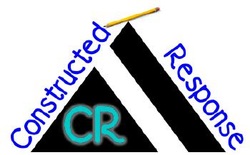NEW TYPE OF QUESTION:
The "Constructed Response Item"
Two Column Note Sheet for our lesson introduction
PDF link

HONORS
The Novel, Lord of the Flies... Practice Constructed Response
Determine the author's purpose for including this sentence in the novel's end.
"Ralph wept for the end of innocence, the darkness of man's heart and the fall through the air of the true, wise friend called Piggy."
Use two details from the text as evidence to support your answer.
Check List:__ Reread the passage,
__ Reread the question.
__ Circle the question's key words.
__ Restate the question in your mind.
__ Plan your answer.
__ Introduce your answer.
__ Then, answer the question.
__ Next, add the right number of text details as evidence.
__ Finally, sum up your answer.
STANDARD
Our Memoir: Night... Practice Constructed Response
Determine the author's purpose for ending his memoir on page 109 with the statement. Elie Weisel makes this statement when looking in the mirror after his concentration camp is liberated.
"The look in his eyes, as they stared into mine, has never left me."
Cite two details from the text as evidence and support for your answer.
Check List:
__ Reread the passage,
__ Reread the question.
__ Circle the question's key words.
__ Restate the question in your mind.
__ Plan your answer.
__ Introduce your answer.
__ Then, answer the question.
__ Next, add the right number of text details as evidence.
__ Finally, sum up your answer.
English II EOC Vocabulary you need to know...
Literary Terms... If the English II EOC is based on the English I EOC, it stands to reason that the tersm used there are going to be the same terms used here. Here are the terms and their frequency as used on the English I EOC:
What is covered on the EOC Grammar and Editing section (listed in order from most often seen to least):
- simile (by far the most popular)
- symbolism
- irony (sometimes listed as ironic, sometimes specific to dramatic, situational, and verbal)
- mood
- point of view
- repetition
- hyperbole
- imagery
- foreshadowing
- personification
- paradox
- conflict
- analogy (as a word – not as in old SAT)
- anecdote
- pun
- dialect
- metaphor
- allusion
- rhyme scheme
- archetype
What is covered on the EOC Grammar and Editing section (listed in order from most often seen to least):
- Verb Tense/Subject-Verb Agreement
- Comma
- Word Choice (replace this word with that word)
- Spelling
- Homophones (your/you're, there/their/they're, its/it's, to/too/two)
- Clarity
- Fragment
- Apostrophe related (plurals or possessive)
- Semicolons (usually in relation to clause combining)
- Capitalization
- Plurals
- How does the author/What effect/Purpose/Why did the author
- What should be added to _______
- Context clues
- Recognize the run-on
- Pronoun case or agreement
- What detail does _______
- Combine sentences to reduce wordiness
- Hyphens (spelling related mostly)
- Parallel structure
- Colons
- Double negatives
- adjective/adverb (choose which to use)
- End mark punctuation
- Quotation Marks
- Contractions
- Who/Whom
- Transition words
- Audience
- Abbreviations
- Literary Terms
- Reading between the lines / Inferring
- Purpose / Why does the author______
- Plot level meaning (not plot line – answers straight from text)
- Theme
- Context Clues
- What is the effect of _____
- Tone
- relationship between lines or title
- Compare / Similarities
- Contrast
- Predict what will happen next
- Dialogue (effect of)
- Audience
"U-N-R-A-A-V-E-L" READING STRATEGY
Thinking Processes: Your steps to analyzing the questions
Remember UNRAAVEL
1. Read the title
2. Predict the passage.
3. Run through and number the paragraphs.
4. Read the questions.
5. Circle the important words in the questions.
6. Read the selection.
7. Eliminate the obviously wrong answers.
a. Reread the question.
b. If the answer choices are quotations from the selection, hunt down each one to mark as Y, N, or M.
c. If after finding the quotations from the selection, you have already forgotten the question, reread the question itself.
d. Narrow down your choices to two, then one.
8. Let the questions be answered.
Remember UNRAAVEL
1. Read the title
2. Predict the passage.
3. Run through and number the paragraphs.
4. Read the questions.
5. Circle the important words in the questions.
6. Read the selection.
7. Eliminate the obviously wrong answers.
a. Reread the question.
b. If the answer choices are quotations from the selection, hunt down each one to mark as Y, N, or M.
c. If after finding the quotations from the selection, you have already forgotten the question, reread the question itself.
d. Narrow down your choices to two, then one.
8. Let the questions be answered.
